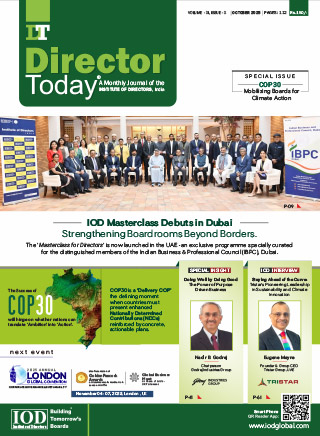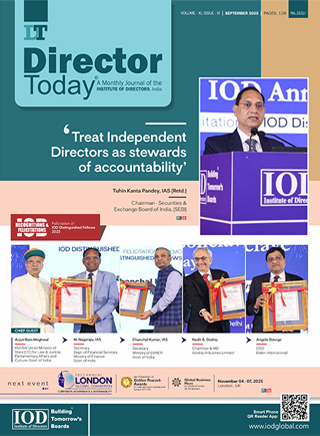Embracing Sustainability Within and Through Corporate Governance: Questions for Directors

The international economy, like the world order, is changing as new fault lines emerge and different practices and strategies evolve. There are fundamental differences in the responses of companies as well as Governments to certain situations. Some might incur considerable financial consequences from withdrawing from a lucrative market to comply with sanctions that they believe are ethically and legally justified. These could include lost revenue and fire sales. In contrast, others may rush to take advantage of an opportunity that this creates. This could be in the form of discounts on purchases or an unexpected chance to acquire assets and operations at knockdown prices.
In various arenas and contexts, directors may face choices that might challenge their beliefs, principles, and relationships. On occasion, boards must balance contending pressures, accompanying requirements, and immediate imperatives with slow-burn risks and longer-term and possibly existential threats. An opportunistic deal may achieve a short-term advantage but might result in subsequent reputational damage as more is learned about circumstances giving rise to an opportunity to take advantage. Over time, ethical, legal, and moral concerns may grow in significance as more weight is attached to ESG considerations.
People often play down the extent to which they benefit from activities that others question or avoid. There is often a gap, and sometimes a gulf, between aspirations, rhetoric, and even expectations and what directors and CEOs decide to do. Good and malign intentions often wilt on contact with the realities of dependency and vulnerability and the possible consequences and implications of making changes or taking certain decisions. Whatever the corporate governance arrangements, outcomes may largely depend upon the decisions of corporate boards and the Governments of the jurisdictions in which they are registered and operate.
Differing Commitments to Compliance
Boards that view corporate governance as less relevant or peripheral to what they are seeking to achieve and as a potential distraction from urgent and more important priorities are less likely to engage with it. They may be more inclined to leave it to someone in the company secretary’s team to ensure compliance and might provide little guidance on compliance priorities. Whether or not people are predisposed to comply could depend on the risk of discovery, possible publicity, and adverse consequences. For situations that suddenly arise, it may not be immediately apparent how leading companies and others might respond.
Executive commitment to ‘improving’ governance and complying with various requirements can reflect director, board, CEO, and senior management interest and involvement. It might depend on the effort that could be required and the possible consequences for themselves and others. The extent to which compliance affects customers could be a significant influencing factor. If corporate governance is viewed as an imposition and cost, unmotivated actors may coast, repeat past practises, and/or be satisfied, doing just enough to be regarded as compliant. Might heightened concern for sustainability increase commitments to compliance?
Cautious cynics might be tempted to delay acting and complying in order to assess the reactions, responses, and approaches of others and whether or not any possible penalties or likely sanctions for non-compliance are significant or a minor inconvenience. Machiavellian directors may seek to gain a competitive advantage over companies that incur higher compliance or conformity costs. Certain customers, investors, and business partners might also wish to make hay while the sun shines, and before concerned legislators and regulators feel they must step in as a result of the approaches of minimalists or ‘free riders’.
Raising Governance and Sustainability Ambitions
When corporate laggards and Governments themselves fail to adequately comply with or respond to an existential threat and legal and regulatory frameworks are tightened, all players, including those who were compliant, may incur extra costs and might have to raise their game. What about compliance with sustainability requirements? In the short to medium-term, the benefits of some sustainability measures might be widely spread across most of a society’s population and its enterprises, while their costs might be most directly borne by those implementing steps such as decarbonization and reducing harmful emissions.
Some unscrupulous directors may not be in a hurry to draw attention to negative externalities resulting from corporate operations and activities. They may want to continue to profit from them while others and the environment shoulder a disproportionate share of the costs. Other things being equal, people may be more inclined to comply with something they approve of or support. How might corporate governance become an enabler of more responsible and sustainable conduct and practises? Should ‘good governance’ and sustainability be actively sought and observed by boards rather than regarded as another ‘nice to have’?
Some attitudes and practises seem so deeply entrenched that catalysts for change may be required to initiate activities and initiatives that will quickly impact corporate and collective behaviours and outcomes. In relation to global warming and climate change, urgent action is required. Who within a company’s board and among its stakeholders is ‘interested’ in calling for changes, whether in governance, reporting, or regulatory practises, that will further sustainability objectives? What leadership and strategy should boards employ to increase the effectiveness and beneficial contribution of corporate governance and value chains?
Accumulating Support for Change
Those employed to undertake governance advisory, assurance, compliance, and/or reporting activities could be said to have a vested interest in more governance requirements. Who else might be costumers of corporate governance, aside from those whose livelihoods are dependent on it and motivated investors? the various interests in governance aligned? Might some of them benefit from more governance, while others may prefer less? From a board perspective and in relation to the increasingly fractured world in which companies operate, where are the priorities for change and the points of leverage? What might influence ESG investors?
Would more focus on sustainability and negative externalities within corporate governance codes, guidance, and requirements result in greater engagement with them? Many companies and communities face common and shared external and contextual challenges, risks, and threats. There should be scope for collaboration in understanding, prioritising, and responding to them. Some corporate-Government relationships are characterised by a degree of suspicion and distrust. Could sustainability and our collective survival on our shared planet represent a unifying factor? How should governance arrangements and boards embrace them?
Given sustainability and survival challenges, what represents a high-performance board? How should one build a board that is appropriate for a company’s situation, circumstances, and context, the challenges it faces, and the opportunities that are open to it? In uncertain times, how might the requirements of strategy, operations, and compliance be better aligned and more focused on sustainability? How can directors ensure the evolution of future boards reflects changing stakeholder expectations and environmental, contextual, and existential risks and threats? What changes to governance priorities or requirements might be helpful?
Assessing Requirements for Transformational Change
Whether or not transformation is desirable and should be supported depends on its purpose and the outcomes and destinations that are sought. Drivers of transformation could include sustainability aspirations, the need for greater resilience, requirements for collaboration, and the imperative of responding to existential threats. Although required, an aspiration for transformation may be accompanied and muted by awareness of the difficulties of achieving it and the risks that might be involved. Rather than just opening a Pandora’s Box of problems, commitment to a transformation strategy can also give rise to opportunities.
Slow and inadequate responses to certain challenges, risks, and threats, such as climate change, in the face of compelling cases for urgent and dramatic action suggest that transformational change rather than incremental improvement strategies are now required. Excellence ambitions and future growth must be responsible and sustainable if disaster is to be avoided. Recovery from the impacts of a global pandemic and responding to the effects of Russia’s illegal and unprovoked invasion of Ukraine add to pressures for ‘doing things differently’. What should a transformative approach to sustainable development encompass?
Whether or not boards, CEOs, and other leaders have visions of better alternatives and attract followers and collaborators can depend on the initiator’s reputation for competence and trust. These may be influenced by the extent to which directors foresee, anticipate, prepare for, and cope with unexpected developments. Individuals, organisations, communities, and the infrastructure and services that support them need to be resilient to handle multiple contemporary challenges and threats. Boards should monitor mechanisms, institutions, collaborations, the supply chain, and other relationships on which their companies depend.
Anticipation and Foresight
Boards that do not anticipate may have transformational changes forced upon them. Slow-burn threats can suddenly erupt. Over the next ten years, many challenges facing boards are likely to be climate-related. Climate change heads the list of many CEOs concerns. The top three ranked in terms of severity of impact in the World Economic Forum’s 2023 global risk report are failure to mitigate climate change, failure of climate-change adaptation, and natural disasters and extreme weather events. One or more tipping points might be reached at any moment, after which global warming may be unstoppable. Sustainability cannot be assumed.
Against the background of wildfires on different continents and recent record temperatures, the UN Secretary-General believes that if the worst impacts of climate change are to be avoided, “dramatic, immediate climate action” is needed. Innovation is critical when providing leadership for sustainability and climate change. How might governance arrangements and board strategies ensure innovation is risk-led and enhances agility, foresight, and resilience? Ideally, recovery, relocation, and transformation should be in a better place. Should governance and strategy be judged in terms of outcomes achieved?
Anticipation and greater awareness and experience of the wider and unequal impact of global warming are increasing pressure for more determined action on climate change. They could lead to renewed stakeholder interest in ESG criteria and UN sustainable development goals (SDGs). Growth is often advocated and pursued with scant regard for its accumulating negative consequences by those who do little to acknowledge or deal with them. Corporate leadership aspirations, policies, and priorities should be environment-friendly and sustainable. Proposals for investments and change should be viewed through a sustainability lens.
Sustainability Imperatives for Corporate Boards
Boards should require business strategies to be both responsible and sustainable. They should consider it from an environmental, social, and commercial perspective and check that relevant and supportive governance arrangements are in place. Ensuring responsible, inclusive, and sustainable outcomes may involve ending certain investments and curtailing and then stopping established operations and activities that lead to negative environmental and social outcomes, especially those that might trigger tipping points. Are directors willing to take tough decisions and act as sustainability advocates, ambassadors, and educators?
What changes to corporate governance arrangements would better enable, support, and achieve sustainability understanding, aspirations, and sustainable outcomes? How and in which areas should companies contribute to the UN SDGs? What should a board’s ESG and business strategy be for formulating, agreeing, promoting, and achieving corporate sustainability goals? Environmental, social, and governance factors are interrelated. How should boards ensure they are aligned and integrated and that differences of perspective and concern among directors and key stakeholders are considered, reconciled, or otherwise handled?
Collaborating organisations and supply and value chain partners will also have perspectives and relationships. Their interests and priorities may overlap without being completely aligned. Could a greater focus on survival, shared and interdependent strategic risks, collective responses to existential threats, addressing negative externalities, and responsible sustainability be unifying factors? How should ESG goals be embedded into business strategy? How might this be done, and negative externalities addressed, in ways that also lead to a positive impact on returns and shareholder sentiment?
Reaping Sustainability Benefits
Boards sometimes overlook the extent to which a company and its stakeholders, as well as the environment, can benefit from more focus on sustainability. Could reputational and other benefits, such as a lower cost of capital, be achieved through more effective corporate governance and sustainability action? How could greater stakeholder involvement in prioritising ESG goals, identifying shared interests, and building stronger connections and mutual understanding be achieved? Could corporate governance reach a positive turning point by embracing sustainability and ESG concerns?
Boards should ensure stakeholders are aware of sustainability actions and outcomes. How might sustainability and related reporting practises be better entrenched? Many directors and executives face a plethora of strategies, frameworks, and codes and the challenge of ensuring they are consistent, aligned, and mutually supportive. For many companies with a growing number of relatively self-contained but related initiatives, the governance challenge is to integrate the elements of ESG into their overall corporate strategy. Resilience statements and other reports could show the extent to which this has been achieved.
The International Sustainability Standards Board (ISSB) has issued inaugural standards for General Requirements for Disclosure of Sustainability-Related Financial Information (IFRS S1) and Climate-Related Disclosures (IFRS S2). Should corporate reporting become more outcome-based? How should these be defined, assessed, measured, and reported, and how might different risk, resilience, and sustainability requirements be consolidated and reconciled? Would an ESG or sustainability committee ensure these areas and related policies are more fully considered in investment, change, and transformation appraisals and reporting?
Reviewing Roles and Responsibilities
Committee terms of reference and compositions should be regularly reviewed by boards and the committees concerned. Could an ESG or sustainability committee help boards develop detailed policies, assess and assure performance, and review compliance without weakening their role, responsibilities, and accountabilities? Is there dialogue, openness, and a relationship of trust between directors and management? What are committees adding to resilience and sustainability outcomes? What oversight and direction should boards provide in relation to geopolitical developments, and where might they go for guidance?
Boards should monitor strategic risks and existential challenges and ensure that opportunities related to them are explored. Longer-term environmental, contextual, existential, and strategic risks often spur innovations that may open up new growth opportunities. Whether they are appropriate and should be a priority can depend on an enterprise’s purpose and priorities. Corporate capabilities may constrain what a board would like to do. Boards should ensure human capital strategies address challenges and opportunities, including the changing nature of work and where, when, and with whom it might be undertaken and supported.
Given recent events and emerging realities, should corporate purpose be re-visited, and might a change of direction be required? When reassessing purpose, priorities, goals, and objectives ahead of critical decisions, boards should be aware of key stakeholder aspirations and preferences. Engagement and liaison with them might be advisable. Boards should pay attention to the views of supply and value chain partners, stakeholders, potential collaborators, and internal teams. Possible partners might be found among organisations other than commercial companies, such as non-profit, cooperative, and community organisations.
Governance and Sustainability Challenges
Many boards encounter similar challenges. Energy and its generation and use have been critical enablers of current operations and lifestyles. Decarbonization is vital for sustainability and a necessary challenge for those involved with carbon-producing activities and processes. What role should boards play in decarbonization, addressing climate change, and ensuring sustainable international supply chains? Climate change and other crises can give rise to multiple adaptation and mitigation-related opportunities. Foresight and being forewarned may enable backup arrangements and contingencies to be put in place and alternatives explored.
Supply chains often stop short of embracing negative externalities and repair, re-use, or recovery activities. These are often critical from a sustainability perspective. Without them, companies are converting natural capital into waste, rubbish, and scrap. How should boards ensure their and corporate reputations are not severely damaged by the actions of partners within supply and value chains? Are changes to relationship management and governance provisions and practises required? Should contingency arrangements and vigil mechanisms for reporting concerns be more regularly reviewed and tested? Are they risk-centric, dynamic, and current?
Digitization can raise sustainability concerns, especially in relation to its energy and natural capital requirements. Companies may use many technologies to secure an advantage and achieve excellence. Are investments in them impacting outcomes? Are they sustainable, relevant to key objectives, and visible to customers? Who benefits, and who might be disadvantaged? Policies relating to AI and other applications or uses of digital technologies should be regularly reviewed to ensure they do not limit beneficial applications or generate excessive externalities. Benefits should be achieved at an acceptable, responsible, and sustainable cost.
Relating Approaches to Situations and Contexts
The nature of work, organisations, business and operating models, and related expectations and contexts are changing. Boards should be alert when organisational innovation is required. In the light of strategic risks and existential threats, sustainability must be achieved rather than assumed. It must become an outcome rather than an aspiration. What are the prevailing trends in corporate governance and sustainability? How might these affect their closer integration? Do they reflect the most significant global risks in terms of impacts? How will the changing nature of work and organisations affect our ability to respond?
Could organisational and business model changes and future governance arrangements increase our ability to quickly scale up and down, collaborate, and re-locate? Will they enhance resilience and sustainability? When considering options and building future boards, past experience and practises must not become a straightjacket. Their relevance in different contexts when changes occur should not be assumed. Thought may need to be given to arrangements for the governance of collaborative responses to challenges and existential threats involving various categories of public, commercial, and voluntary organisations.
A mix of approaches might allow for greater diversity. While beneficial, could this come at some cost in terms of lack of clarity and confusion? What reforms and revisions would be welcome in current corporate governance codes, and to what and for whom? Could provisions relating to audit and reporting deliver greater value in relation to the cost of their implementation, assurance, and compliance? How would more information on culture and resilience be used? Would various governance requirements, models, codes, and frameworks have more impact if they were better aligned, simplified, rationalised, or integrated?
Discussing Alternative Approaches
There are many issues for participants in the 2023 London Global Convention on Corporate Governance and Sustainability to consider. How might corporate governance and sustainability become more integrated? Would alternative governance approaches be more relevant for certain types of enterprises and some forms of collaboration? Corporate and other leaders should understand how to connect, engage, and inspire. They must develop, release, and harness relevant potential, understanding, commitment, and action. To attract directors, governance requirements, risks, and penalties must not be too onerous in relation to their remuneration.
Embracing sustainability within corporate governance arrangements and the consequences in terms of re-visited corporate purposes, priorities, goals, and objectives might encourage longer-term thinking and renewal rather than survival. Directors should ensure this leads to more diverse, inclusive, and effective boards and delivers positive rather than negative externalities. The forthcoming London Global Convention will provide an opportunity to network, explore options, alternatives, and possibilities, discuss how directors’ dilemmas might be resolved; and learn from the latest batch of Golden Peacock Award winners.
Author

Prof Colin Coulson-Thomas
He holds a portfolio of leadership roles and is IOD India’s Director-General, UK and Europe. He has advised directors and boards in over 40 countries.
Owned by: Institute of Directors, India
Disclaimer: The opinions expressed in the articles/ stories are the personal opinions of the author. IOD/ Editor is not responsible for the accuracy, completeness, suitability, or validity of any information in those articles. The information, facts or opinions expressed in the articles/ speeches do not reflect the views of IOD/ Editor and IOD/ Editor does not assume any responsibility or liability for the same.

 Quick Links
Quick Links
 Connect us
Connect us




 Back to Home
Back to Home































